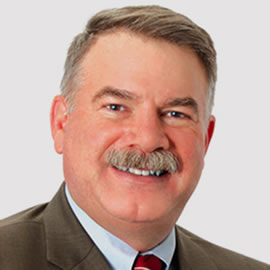“Extraordinary times call for extraordinary measures.” — Benet Wilson

Editor-In-Chief, Chester “Trip” Buckenmaier III, MD, COL (ret.), MC, USA
Last month’s U.S. Medicine August 2020 editorial, “It feels like writing ‘Bad things are about to happen’ on a napkin and then setting the napkin on fire.” — Colin Carlson, was angry. This month’s editorial is an admission of regret for that anger, a recognition that anger serves no useful purpose in the face of national tragedy. It perhaps defines a better way to act going forward. Admittedly, the editorial was cathartic for me. Still, I am not sure it was much of a public service to my readers. The depth and breadth of the COVID-19 pandemic in this country has been overwhelming to society. It has exposed divisions in our union that have been simmering under our national veneer of unity. I have always believed that the United States was and is the best and fullest expression of democracy the world has ever seen: a government truly for the people by the people. We are the world’s example of how a culture could, despite its many diverse opinions regarding religion, ethnicity, politics, sexual orientation and economic standing, still coexist and thrive. I continue to believe these things, although the last few months experiencing the impact of COVID-19 on our society have been humbling to these ideas and a challenge to these beliefs.
Despite my rant last month regarding the reality of many American’s failures to follow the simplest of recommendations to stem the spread of the deadly SARS-CoV-2 virus in our population, Americans with other opinions regarding the subject have carried on with activities which experts suggest enhance the transmission of the disease. As I write this, the annual Sturgis Motorcycle Rally in South Dakota is in full swing, with thousands of bike enthusiasts crammed into the little town, ignoring social distancing and masks. The lead singer of the music group, Smash Mouth, entertaining at Sturgis, reportedly exclaimed to the packed audience, “We’re all here together tonight. F— that COVID s—.” The statement would be laughable if it were not such a sad expression of how misinformed an individual with significant social influence can be. SARS-CoV-2 viral particles are not offended by the comment. However, the virus’ primary function to spread was likely served well by this event. Hopefully, the concert was worth the lives this event will probably cost.
More self-righteous anger from me is not going to improve these situations. So, what is a concerned federal physician with the country’s best interest in mind to do in the face of this poor public behavior regarding the pandemic? Many of you have, and are, working on the front lines of this pandemic daily in our federal hospitals combating this virus. Bless you, and thank you. For those of us who are not epidemiologists or involved in the clinical COVID-19 battle, we can fall back on our most essential function as purveyors of the healing arts —education. The title “doctor” originates from the original Latin verb docēre [dɔˈkeːrɛ] “to teach.” I have always felt I am at my best as a physician when I am involved in educating my patients concerning their health or educating residents and fellows in medical practice. I perceive there is a tremendous amount of misinformation and disinformation regarding this pandemic. As federal medicine providers, our commitment to public service is established, and our opinions are free of motivations involving financial gain. Our society desperately needs our advice and educational efforts regarding the general understanding of the COVID-19 pandemic. I challenge my fellow federal medicine colleagues to aggressively seek opportunities to educate and influence the behaviors of those around us to promote practices that can reduce the burden of this pandemic on our country. In this spirit, I would like to share a letter I recently sent to encourage better behaviors:
To: Chancellor of Catholic Schools – Archdiocese of Baltimore,
I am writing you as a career federal physician and father. My daughter is presently serving the Catholic community as a second-grade teacher within the Baltimore Catholic school system. I am deeply appreciative of the educational work the Catholic church performs in educationally underserved regions of the country and the educational opportunity in teaching that these institutions have provided my daughter.
I am concerned about the decision to open the Catholic private schools this fall in Baltimore in the face of the ongoing COVID-19 pandemic that has raged in this country for months now, out of control. While I can sympathize with the reasons driving this decision, a desire to educate the young and support working families, I believe this decision is ill-advised. The medical science regarding this novel virus in humans remains ambiguous.
Admittedly, I am not an infectious disease expert; I specialize in Anesthesiology. However, as a physician, I can follow the science. On a positive note, we do know that face masks, frequent hand washing, and social distancing significantly reduce the potential for viral spread. Sadly, these simple solutions have been challenging for many adults in our society. I find it difficult to believe young students will be able to consistently follow these rules within a school designed for children to interact with each other and their teachers.
Perhaps of more concern is the medical community’s lack of complete understanding of the effects of the SARS-CoV-2 virus infection on the human body. The impact of the virus on the respiratory system in the hospitalized patients is obvious, but the long-term effects of the virus in patients with symptoms that do not require hospitalization, as is the case with many infected children, is not understood. Personally, I am genuinely concerned about the possibility that this virus results in the development of a hypercoagulable state leading to microemboli (small clots) in the blood stream. Reports from healthcare providers on the front lines in managing patients with the virus suggest morbidity resulting from the infection extents to many organ systems beyond the respiratory system to include the brain. Perhaps this hypercoagulable state is responsible, we just do not know. Furthermore, medical science does not know the impact this infection has in children. None of the current COVID-19 vaccination trials involve subjects under 18 years of age.
What message is the Catholic school system sending students and parents when they open schools in a city experiencing an increase in COVID-19 cases without understanding the potential health ramifications of this devastating disease? Or without viable protective measures in the schools? For example, it is my understanding that some classrooms have student desks that are three feet apart instead of the recommended six feet.
Extraordinary times call for extraordinary measures. My medical opinion, based on the best science currently available regarding COVID-19, is that it is a mistake to open schools at this point in the pandemic. I believe this will only contribute to the existing inexcusably poor response our society has mounted in reaction to this health crisis. There is time to reconsider. I urge you take the opportunity to reverse this poor decision.
Respectfully, Chester C. Buckenmaier III, MD
This letter is not angry, but it is direct. My basic premise is there currently is not enough science regarding SARS-CoV-2 infection in children to safely return to school in regions, like Baltimore, where the virus is spreading out of control. I do not necessarily expect this letter to change anything, but this decision by the Baltimore Catholic school system does impact my family directly. I have decided not to be angry about this anymore. Instead, I plan to be vocal, armed with the best science available, to educate as often and widely as possible. I feel that it is my duty as a federal healthcare provider. I hope you, the reader, will also put down the burden of anger and educate without malice on the science of this pandemic. I believe this approach is healthier and of far greater public service than raging at public folly regarding this pandemic.

